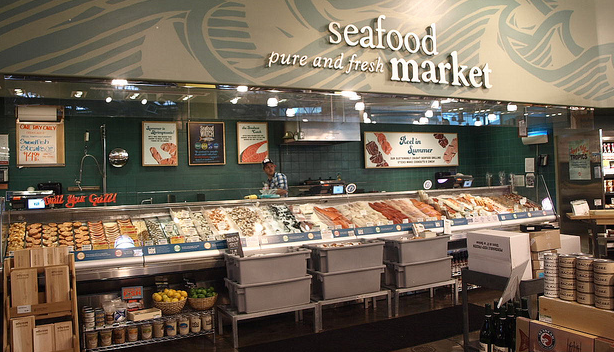For the second consecutive year and fourth time since 2008, green organic grocer Whole Foods Market earns the top retailer position in Greenpeace’s annual seafood sustainability ranking in the United States, according to Business Wire.
With both the highest overall score and strongest seafood sustainable policy, Whole Foods is a retailer looking great in green.
Back in 2012, BizEnergy called Whole Foods a green grocer — since, they’ve taken home the title of top retailer in seafood sustainability two years in a row and have become even greener.
How did Whole Foods earn this sustainability ranking?
Earning the top ranking in seafood sustainability for retailers is quite the feat — and Whole Foods seems to have a solid strategy down. From their canned tuna to their wild-caught seafood, Whole Foods makes smart sustainable purchases opting for fisheries certified by the Marine Stewardship Council (MSC) or sourcing their products from the Blue Ocean Institute or Monterey Bay Aquarium that achieve “Best Choice” or “Good Alternative” ratings.
In Greenpeace’s eighth edition of their annual Carting Away the Oceans report, Whole Foods number one ranking highlights their seafood sourcing and sustainability.
Their canned tuna is known to be delicious but more importantly — their new line Pole and Line Caught tuna launched this May is being called the most sustainable canned tuna option on the market, according to the press release.
Taking sustainability practices seriously, Whole Foods aquaculture policies are top of the line — which Greenpeace positively noted as they ranked highest out of 26 major retailers.
Taking their green mission seriously, Whole Foods is an environmental leader in the retail sector
Though BizEnergy has praised Whole Foods for local vendors, environmental practices, white roofs, energy and water efficiency, waste management and awesome products in the past — they’ve stepped up their green game since we last put the spotlight on them.
“We were the first retailer to offset 100% of our energy use with wind energy credits,” says Whole Foods on their official website, “And we are glad to see that some of the world’s largest retailers are following the example we’ve set in green building, the use of solar power, company-wide recycling programs, internal green mission programs and support for organics.”
Their green initiatives address water conservation, compostable food packaging and even printing standards. Conscious of their greenhouse gas emissions, Whole Foods has reported their goals to the Carbon Disclosure Project.
Whole Foods is all about quality, health, sustainability and good business. BizEnergy congratulates this green retailer for their Greenpeace achievement!
For businesses curious about their energy consumption, we have an Interactive Energy Audit (free!)
Image credit: pavonessurfschool.com



















